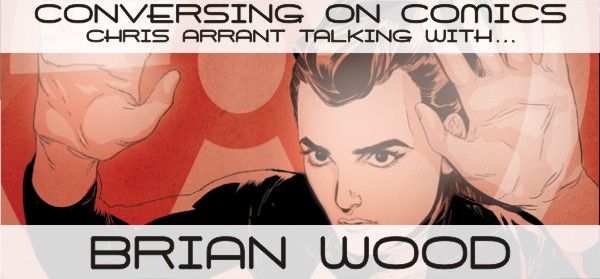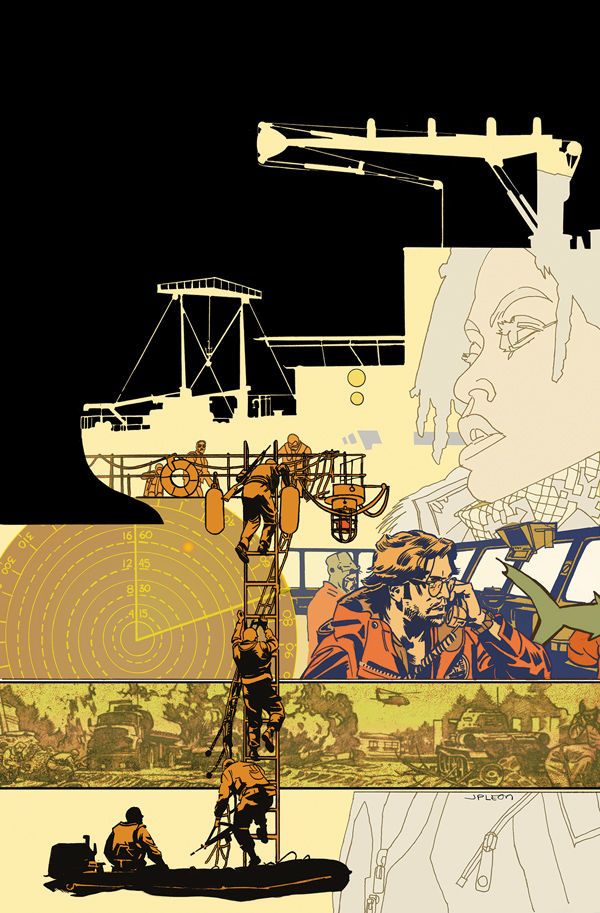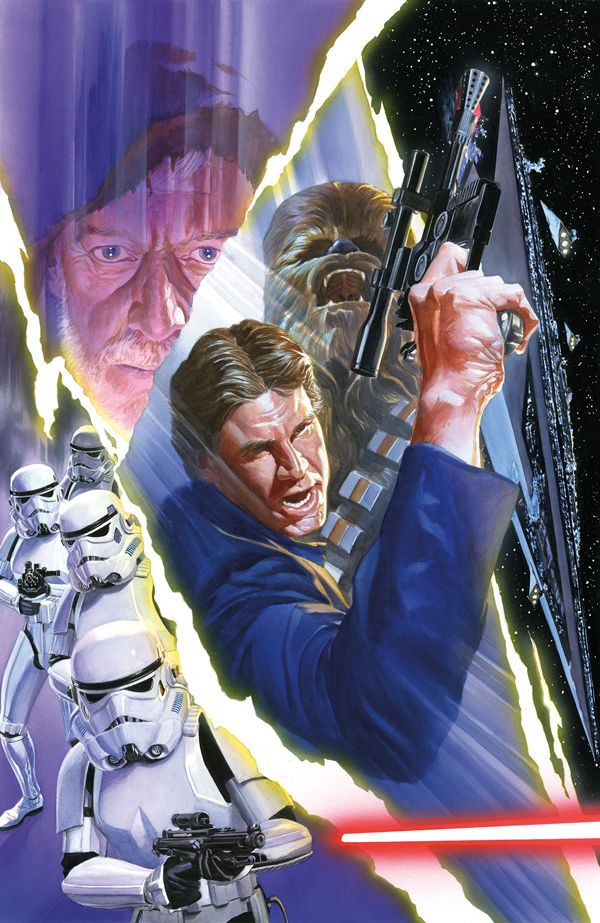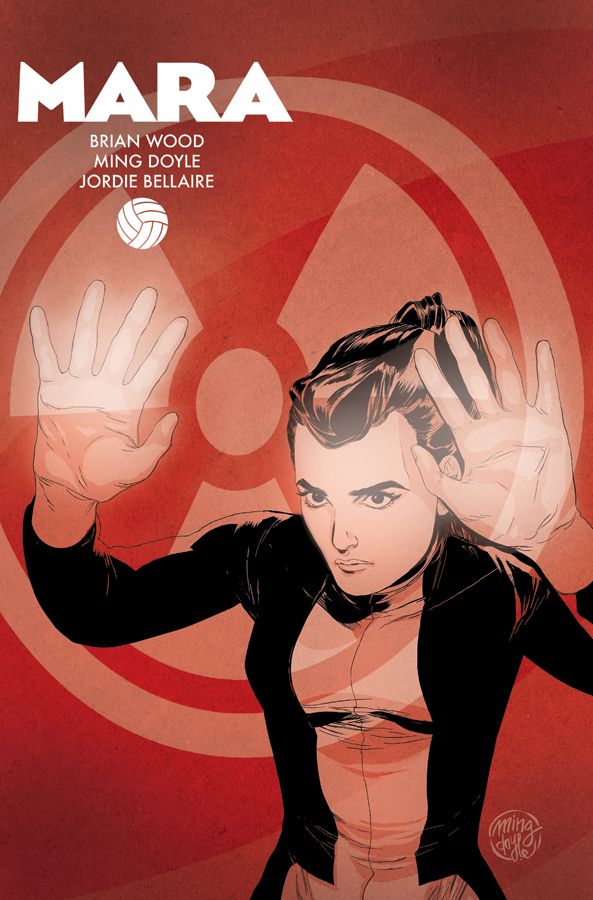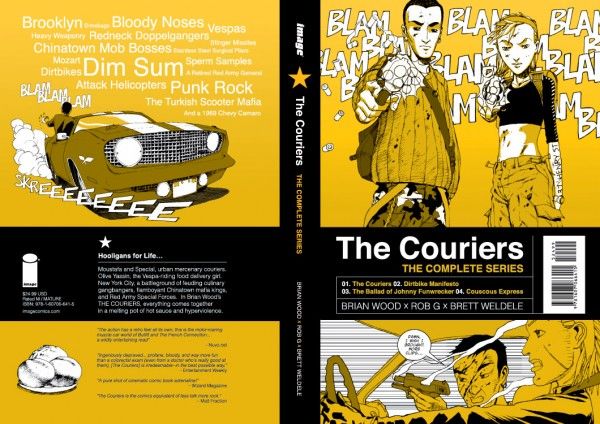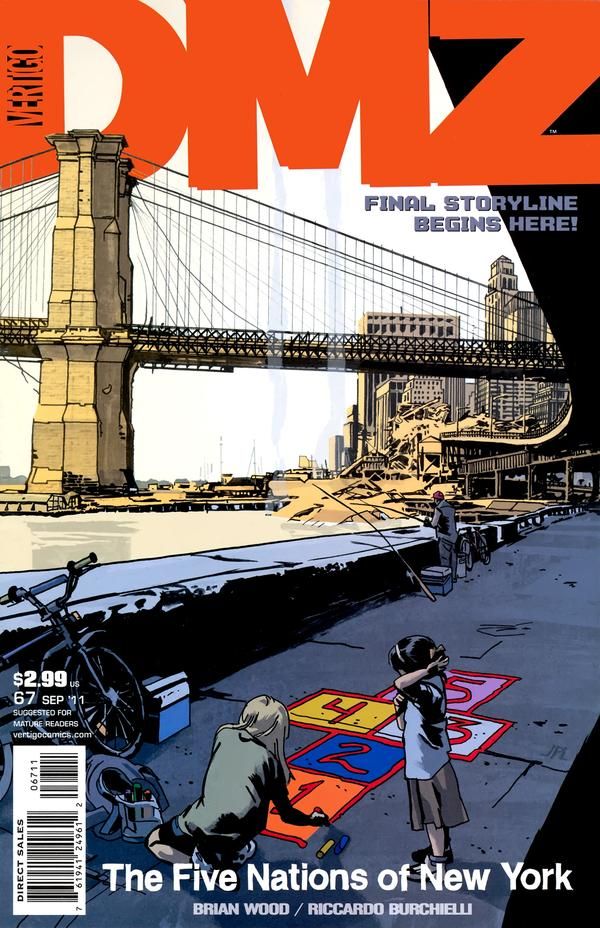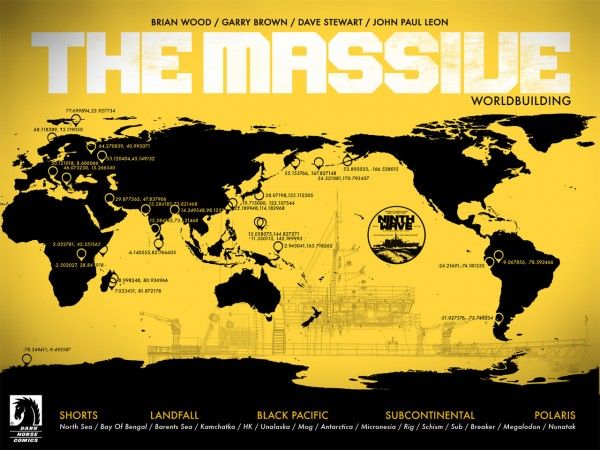This has been a year of change in comics -- for creators, for individual titles, for companies and for the industry at large. For Brian Wood, it was professionally one of his most volatile years since he quit his day job as a designer to work in comics full-time. It saw Wood end his twin creator-owned titles at Vertigo (DMZ and Northlanders), end his exclusive contract with DC Comics, and begin a new era mixing creator-owned with an unprecedented (for him) number of work-for-hire books
As we stand on the edge of this year and peer into the next, Wood is looking to build on 2012 projects like Conan the Barbarian, The Massive and Ultimate Comics X-Men with a new creator-owned series, Mara, debuting next week from Image Comics, and then on Jan. 9 launching his highest-profile project to date: Star Wars, a highly anticipated Dark Horse monthly set between the events of A New Hope and The Empire Strikes Back and featuring familiar characters like Luke Skywalker, Princess Leia and Han Solo. Brian Wood Month redux? Perhaps.
Comic Book Resources has interviewed Wood about each of his upcoming projects, so in this conversation I'm able to focus on the big picture, addressing his career and the context of his projects. Wood and I discuss changes at DC that led to his departure, what could have been had he stayed, and his plans both inside and outside of comics.
Chris Arrant: Help me get an idea of where your head is at, Brian ... what are you working on today?
Brian Wood: Well, it's Saturday, and typically I try and have one day be a day of no work for the family, and then the other I work most of the day and night. I have two scripts to finish this weekend: Star Wars #5 and Ultimate X-Men #23, and ideally a first draft of some world-building writing I'm doing for a video game developer. This is going to be a rough weekend.
What would you be doing if you weren’t working on that?
I'd be hanging out with the kids, helping out with the kids, and so on. My fantasy would be to lie on the couch and finish this Junot Diaz book I'm obsessing over.
You mentioned world-building; do you tend to do a large about of “world-building writing” before embarking on your comic series? And if so, how detailed is it and how does it help you a couple years into the book?
There's always a fair amount of that in the pitch document, and separate from that I write a document for my film/TV rep. so she has the full scope of the series. But I don't detail every single thing. I've found as long as I have defined the "rules" of the world, its easy to keep adding on to it and keep it unified and coherent. It'd just not practical to try and detail it all in advance, because the best ideas come to you as you're writing the scripts.
On your website you described 2012 as “the beginning of the second major phase” of your career. From your perspective, what is the break – the end of your tenure with DC?
Not DC specifically, because I don't think the company itself was that big an element in the work I did ... meaning, my projects weren't "DC projects," they aren't defined as such. I consider the break to be the conclusion of DMZ and Northlanders, two very long-running, ultimately very successful series that defined who I was as a creator. And, once finished, they were both an ending and a fresh start. At the beginning of 2012, I had no projects that weren't brand new.
What was it like to have such a clean break – with the conclusion of DMZ and Northlanders – leaving you really up in the air in terms of what you were to do next?
In the thick of it, I guess it didn't seem like such a clean break. Once I had a little bit of distance I could see it better. But I was trying to play ball with DC and keep the flow of work coming from them ... I feel like if this were still the Paul Levitz regime, I'd be doing The Massive at Vertigo, a DC book or two, and so on. It only became a proper real break when I was forced to go out and find new publishers to work with.
And for this second major phase, would you say that your frame of mind is different in regards to your writing work? And if so, how?
I'm obviously doing more licensed books, and this was going to be the case even if I had stayed at DC. The time felt right to explore this aspect of the biz. The only downside, if you can really call it that, is coming off the success of two long-running projects is you get A LOT of job offers, and some of them were very hard to say no to. So I have too many projects on my plate at once, and way more company-owned books than I thought I would do. On the upside, these are marquee franchises: Star Wars, Conan, The X-Men, and they are well worth being busy for.
As far as frame of mind, I'm just trying not to phone anything in. I've learned to write much, much faster, and based on reviews and reactions the work isn't suffering for it. I'm working on finding the right balance between working really hard to deliver great work on these licensed books, but keeping an emotional detachment from the material, since, obviously, I don't control it, and am not even the legal owner of my own work. This is a new experience for me.
Going into that idea of you holding licensed book at an emotional arms length – can you talk about your feelings on this? What is the hardest part of holding yourself back from being too emotionally invested in the material you don’t own?
It's not hard at all. I think I find it especially easy because I didn't grow up reading superhero comics, so while I enjoy something like the X-Men, I don't have emotions from childhood getting in the way, and neither does working on this material define me as a writer, so I can really approach it the correct way: as a job. If there is a hard part to this, its coming at it like that and still investing yourself professionally enough to bring your A game.
And what about your continuation of creator-owned work with The Massive and Mara?
The Massive is an important book for me, in many ways of course, but specifically in the sense that I'm funneling everything I've learned over my career into it. It's the absolute best writing I am capable of right now, I believe, and I'm immensely proud of it all, the work everyone's been doing on it. Following DMZ and Northlanders, I knew I had to deliver something that was better than both of those.
In the next three weeks you have two big debuts, your creator-owned series Mara with Ming Doyle at Image, and then your unique Star Wars series at Dark Horse. First, Star Wars: How’d that come to you?
They asked me, simple as that. I realized, immediately, that if I ever wanted to write a Star Wars comic, this would be the one to write. So I said yes. Sometimes getting a great job is this easy!
What were the initial conversations like for Star Wars?
Randy Stradley, the Star Wars editor at Dark Horse, got on the phone with me and explained what they wanted to do, which was to create this book that used the classic characters and wasn't deep in the Expanded Universe continuity. And he asked me what I thought I would do with that. I replied with a couple pages of loose pitch that talked about exactly what eventually came to pass, and that was basically it. The editors at LucasArts had approval as well, which came with minimal changes. A very smooth process in all respects.
I don’t see you as a huge Star Wars nerd, but over on your Tumblr you made a post about how surprisingly easy it is for you to write this, pointing out several moments you didn’t need any research to get into the Star Wars terminology. Can you describe your awareness/appreciation of Star Wars before you got approach for this series and then now that you’re working in it?
I always liked Star Wars. But I wouldn't have ever called myself a nerd or a geek about it. Large chunks of my life have passed without watching the films, or probably even thinking about Star Wars. But I guess its a testament to my long-term core memory drives, because when I needed it, all this information was dredged up and then I FELT like a geek. Some of my friends laugh at me about it, but whatever, it came to be honestly, and I get paid for it too!
For the rare cases when you do need to research for your Star Wars book, what are your go-to reference sources?
Wookieepedia! I love saying that word. I also have a Star Wars atlas, full of maps of the universe, which is sometimes helpful. My editors as well, of course.
2012 seemed to be a year you stepped out of strictly doing creator-owned work to beginning to work more on work-for-hire projects. You didn’t get a chance to do much at DC besides the excellent Dv8: Gods & Monsters, you’ve become a part of Marvel, but Star Wars as a franchise eclipses all of those by a large margin. Any reluctance or thoughts on your part wading into that given how many, and how ardent, Star Wars fans can be?
Early on, I had this assumption that Star Wars fans would fit some sort of "worst kind of fan" stereotype, all crazy and obsessive and angry, like you see a big chunk of the online comic book fandom as being. I figured the bigger the property, the worse the fans, I guess. That's not true, and in fact its been the Star Wars fans that have been the nicest, most welcoming, and happiest. So maybe at first I had some worries, but I don't now, and the fans I've met have driven me to try harder, to be more worthy of the opportunity and the material.
And I should point out there's no rebooting or Ultimatizing happening here -- nothing's changing in the universe, in the existing stories, and everyone's in-character. I'm writing some new stories that slot into the space between A New Hope and Empire, leaving everything around it intact.
Right after Christmas you’re debuting Mara. From what I’ve read, it seems to be you examining and extrapolating on the sports and the celebrity nature of it. Is sports something you’ve been following for a while, and how did it inform your story of Mara?
Sorta. What's been in the back of my mind for awhile, I think since DV8, is the sports-overtones in superhero comics. This isn't groundbreaking, I'm not the first to suggest this, but when I was redesigning the DV8 costumes, all the reference I was collecting for Rebekah Isaacs was sports gear -- BMZ pants, yoga clothing, track jackets, snowboarding parkas and so on. The other bit of inspiration came from a certain DC superheroine I'm not writing, and the idea of an athlete as an ideal cover identity.
And specific to a female character, I find sports culture, especially professional sports, to be rife with the worst of what society puts upon young women, while expecting the best out of them in return. That's worth talking about.
In your previous work I’ve seen you take on the future in various stories, from the tragic in DMZ and The Massive to more gleaming futuristic societies like Supermarket. What kind of personality does the future setting in Mara have, different from those?
More gleaming than dystopia, but with its own tragic edge. The world of Mara is one full of societies striving for perfection, but the ugly stuff is still there under the surface.
I picked up the recent Couriers collection last week re-read all those original stories. It jumped out at me at how those stories are in a way stylistic prequels to your later work like DMZ and The Massive. Would you say doing urban, rebellious stories, semi-political stories is your comfort zone?
It's easy for me, even more so now than back in 2001-2004 when I wrote The Couriers. It's also expected of me to an extent; it's become my identity as a creator even when its not warranted. Writing The Couriers, though, was not part of a larger attempt to form a persona or a brand, but just me trying to have a laugh with friends. Trying to capture the energy and goofiness of the films I was into at the time, lots of HK and Luc Besson B-grade action movies. I was working a full time job during this time, and comics was a sort of release, a semi-serious hobby to do in my off hours. I don't say any of this to denigrate it, just put it in context to other books. Shortly after writing the final Couriers book, I quit my day job and jumped full force into Demo, my first project with the aim of doing this as a career (and it ended up making my career).
I assume that in doing this collection you spend a lot of time re-reading the original Couriers materials. Going back and reading your work from some time ago, are there things that stuck out to you that you didn’t remember – either characters, storytelling tricks, panel transitions, etc. – that surprised you?
I didn't even read it once! I so, so rarely read old work. I often don't even read it when it just published, either. From what I hear, this is pretty common amongst my peers.
Another thing was how you passed the design part of this over to Jared K. Fletcher, based on your design work for these graphic novels when they originally came out. Am I reading too much into this, or are you taking a conscious step back from doing as much design work for your books as you used to?
It was only a function of time, and of knowing Jared for a long time and knowing he'd love to design a book from cover to cover. The original lettering files, from AiT-PlantLar, were done in such a prehistoric version of Quark that there was no way to import them into a current design program or even open them up in the oldest version of Quark I could locate. The best we could do is take print-res PDFs from the printer and do a page by page extract and reassemble the fucking thing into something that looked like humans made it. It was insane, and I didn't have the time or the CPU power. So we hired Jared, and just like with the hardbound edition of Local, he did a better job of it than I could.
I did design for the Channel Zero collection, and do as much as I can on The Massive.
We mentioned DMZ earlier, and on your blog you’ve been showing off some archived files of unrealized projects, including a television pitch for DMZ. In that post, you said you’ve written two of these -- one in 2007 and one in 2009. What was it like to self-examine your story and do it for a different medium?
It was weird the first time, and much easier the second. In 2007 I was only a year and a half or so into the series and didn't have a grasp on the big picture of it all. So the treatment DC asked me to do was a more or less literal adaptation of the first two volumes. Which worked, it served as a complete story but was not particularly deep or represented the promise that the high concept offered. In 2009 I had so much more story to work with, and thinking of it as a TV show and not just a single 90-minute thing allowed more story to be used and more rounded take overall. I was also less precious about it all, since DMZ wasn't so new.
Although the DMZ show isn’t a reality (yet), did doing those two TV treatments help give you a broader sense of the comic for writing its final years?
Not for the actual writing, since the narrative of the comic isn't necessarily that of a film or movie. But it did force me to clarify my thoughts about the book overall, to understand what I was spending years working to build, and what was important enough to me to keep and what I could allow to be cut in any future adaptation. Overall, it gave me a new angle on the series.
Since we’re speaking of DMZ, could you ever foresee yourself returning to do more in that world perhaps?
I don't. Never say never, of course, but to be perfectly blunt, I wouldn't go back for purely creative reasons. ... I feel like I said what I wanted to say. But in the ultra-rare chance that a TV show is made and its some insane runaway hit I could see Riccardo Burchielli and I doing some more books to take advantage of that once-in-a-lifetime opportunity. I'm sure to some people that sounds like selling out, but whatever, you know? We own DMZ, and not to speak for Riccardo, but I'm over 40 with two kids and that sort of thing can raise the level of financial security I can offer my family significantly. That's really the most important thing to me. So I would absolutely take advantage of that increased demand for DMZ, should it ever happen.
Also posted on your site is the “Near Misses From The DC Era” post, which I blogged about here at Robot 6 earlier, chronicling several creator-owned and work-for-hire pitches you made during your time there. You revealed some very promising takes on existing DC properties, as well as some bittersweetly excellent sounding series, I presume, intended for Vertigo. How do you feel about these projects that were never fully realized?
I regret a few -- the one with Jamie McKelvie, if only because that book was approved and it was work Jamie was counting on. And the fact that I couldn't give him an answer as to why it up and vanished was embarrassing for me and probably infuriating for him. I regret not being faster to pitch Starve, because its a good idea and now I feel like there's a minor glut of foodie-related comics. I actually pitched it to Oni Press recently and they passed on it, citing that exact reason. It's time has probably passed.
The DCU stuff I don't regret creatively. I'm a little bitter at being burned the times I was, but all I have to do is look at my output in this last year, work that 100 percent would not exist had it not gone to such shit at DC, and obviously I have nothing to complain about.
Has your approach or thoughts on pitching comics changed since your time at DC?
I learned a lot. Being shown the door in such a cold way was not something that had ever happened to me, so its a good life lesson for sure. I now fully know the value of not having all your eggs in one basket, and I'll never again sign a contract on a creator owned comic that doesn't give me both full ownership and control over the media rights. I also understand, on a broad level, that no one is looking out for me but me, regardless of what a publisher says. That doesn't mean I don't trust the actual friends I have at Marvel, let's say, but I know that sometimes that doesn't matter when you're dealing with a corporation. My eyes more open these days.
Thinking more positively about all those ideas that haven’t become comics – could we see some of those pop up again in 2013?
I know what my next big creator-owned project will almost certainly be, and its not one of those on that list. What is called Anthem now, something completely different from the one with Jamie, I hope will see the light of day.
And in general, what does 2013 look like for you? What are your big goals for next year?
To do at least one less book, and more creator-owned. To continue diversifying so I have an "exit strategy" if and when making a living in comics becomes too difficult. I've been doing this for fifteen years, I'm over 40, and I'm going like a bat out of hell and risking burnout. I don't know how long my time at bat's going to be. I don't want to be a casualty of the comics industry, or to be 50+ and fighting to find whatever work I can get just to scrape by. I'm socking away all the money I can, building a huge backlist (I think I'll have 12 new trades out in 2013) and looking for things I can do other than comics. It's the smart, practical thing to do.
What would possibly that “other things” entail? Something like the video game work you mentioned earlier?
I've had so many false starts at writing for games, I'm sort of tired of beating my head against that wall. It's also brutal work-for-hire in a way that can make the most ruthless comic book publisher seem like a teddy bear. I think its more likely I'll be writing novels and screenplays.
So do you have an idea for your first novel?
I have a few things that can either end up as a novel or a comics series. Time will tell.

